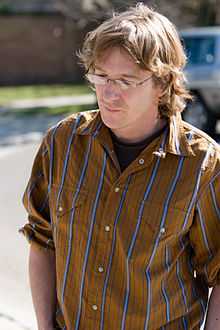Chris Paine

Chris Paine is an American filmmaker. His most notable works to date as director are the documentaries Who Killed the Electric Car? and Revenge of the Electric Car.
Career
Paine served as Executive Producer on the documentaries Faster, William Gibson: No Maps for these Territories and Charge! directed by Mark Neale. Other directing and producing projects include MTV/Initial Film's Buzz (1990) and shorts including Mailman (Sundance, 1995), Trillion Cubic Feet (1992), Looking Back (1994), and Return to the Philippines (1986). Paine assisted writer/director Michael Tolkin on the feature films The Player and The New Age. He was a segment producer for Zoo Life with Jack Hanna.
In the wake of the Gulf oil disaster in 2010, he co-founded Counterspill, an online project about non-renewable energy disasters.
Education
Paine studied acting at the Neighborhood Playhouse, attending during the same years as actors Dylan McDermott, Allison Janney and screenwriter Steve Rogers. He studied film at New York University and Stanford University with the documentarian John Else. He graduated from Colgate University in 1983, where he was member of Sigma Chi. He is on a list of Distinguished alumni.
Business
In 1984, Paine co-founded Mondo-tronics, which provided robotic materials for the Mars Pathfinder mission, specifically Aiding in dust removal.[1] His firm Internet Outfitters (founded in 1994) merged in 1999 with AppNet Systems, which in turn was bought by Commerce One in 2000.
Filmography
Director:
- "Who Killed the Electric Car?" (2006)
- "Revenge of the Electric Car" (2011)
Executive Producer:
- "Charge!" (2011)
- Faster (2003)
- No Maps for These Territories (2001)
Miscellaneous Crew:
- The New Age (1994) (assistant to writer/director Michael Tolkin)
- The Player (1992) (assistant to Michael Tolkin)
References
- ↑ Needles, Tim. "Director Chris Paine on his Film Who Killed The Electric Car". Short and Sweet NYC. Retrieved 23 January 2012.
External links
- Chris Paine at the Internet Movie Database
- Papercut Films, the California-based production company for Chris Paine
|